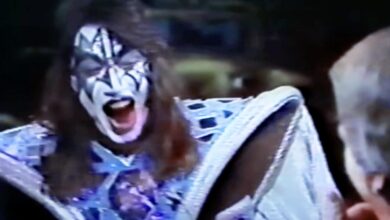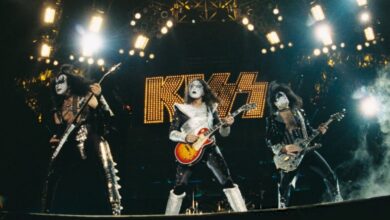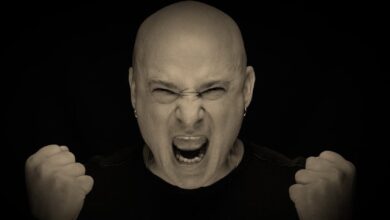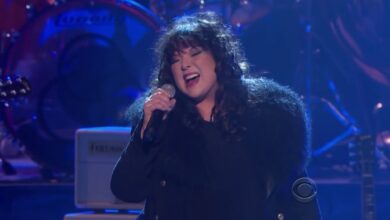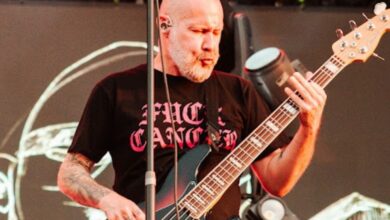The Night Limp Bizkit’s Heartbeat Roared One Last Time: Sam Rivers’ Final “Break Stuff” Performance
On a hot Tuesday night, August 12, 2025, Etihad Arena on Yas Island felt less like a venue and more like a pressure cooker waiting to blow. Doors had opened at 7 p.m., and as the clock crept toward showtime the concourse filled with a mix of diehards in vintage tour shirts and first-timers ready to shout along to choruses they’d grown up hearing in gyms, on late-night TV, and in the back seats of dusty cars. The LED ribbons snaked around the bowl, pulsing in reds and whites that teased what was coming. Even from the upper tiers you could feel the floor rumbling—the sort of anticipatory tremor that tells you a crowd has already chosen to be legendary before the band plays a note.
Limp Bizkit didn’t so much “take” the stage as detonate it. The house lights went black, the intro rolled, and a sudden flood of brightness revealed Fred Durst in his trademark cap and a grin that hovered between mischief and menace. John Otto’s kick drum hit like a gut-punch; Wes Borland, facepainted and otherworldly, drew out a clangorous drone; and the arena answered with the roar of a thousand Friday nights compressed into one. The pit compacted, phones shot skyward, and a city built on speed and spectacle found a new way to measure velocity—by decibel.
Abu Dhabi didn’t get a warm-up; it got a blitz. “Hot Dog” came in early and fast, the syllables stacked and spat like a dare, and at exactly seven minutes past the hour the riff everyone knew was inevitable arrived like a brick through glass. “Break Stuff” is less a song than a cultural pressure valve, and when Borland cut loose with that lurching, seesaw guitar, the entire lower bowl leapt as if tugged by cables. Security lines held, but only just. You could read the chorus from bodies as much as lips—every jump, every stomp, every push a punctuation mark in the air.
What makes “Break Stuff” work live, 25 years after it blew out of car stereos worldwide, is the way the band weaponizes space. There’s a millisecond of silence before each downbeat that feels like a cliff edge, and Otto’s snare arrives as the drop. In Abu Dhabi those micro-pauses stretched just enough to make a few thousand stomachs swoop at once, then collapse into a single howl. Up on the sides, clusters began pogoing in imperfect unison; down front, a rotating circle formed and dissolved, a human eddy that turned the arena’s polished concrete into temporary surf.
Durst is a conductor disguised as an instigator, and he proved it again. He goaded, joked, pivoted from smirk to sincerity in eight bars, then held a command like, “Everybody in the back!” until the rafters felt personally addressed. He’s learned to ride the nostalgia while refusing to be handcuffed by it—slipping little rhythmic hesitations into his phrasing, barking a line, then dropping to a near whisper that pulled phones down and eyes up. When he hit the “I think you better quit…” pre-chorus, the band throttled back just a hair, and you could feel 14,000 lungs prime for ignition.
Wes Borland remains the band’s beautiful contradiction: a sculptor of ugly, glorious noise dressed like he fell out of an avant-garde gallery. In Abu Dhabi he toyed with the main riff’s attack, rolling the pick a fraction, letting the notes smear and then snap clean, so the groove felt like rubber—stretch, release, stretch, release. On the bridge he layered in harmonics that pinged off the back wall like radar, then dropped into the kind of palm-muted chug that turns a crowd into a single vertebra. You could practically hear shoulder joints loosening two sections over.
The Etihad sound crew deserves its roses too. “Break Stuff” can become soup in the wrong room, bass swallowing detail until the track is one undifferentiated rumble. Here, the low end was huge without being lawless—sub frequencies that made your sternum buzz, but with enough definition to let Sam Rivers’ lines live in their own contour on the original arrangement, the way fans remembered them. In a venue built for prize fights and pop spectacles, the mix stayed surprisingly articulate; every cymbal wash carried air, every guitar scrape had teeth.
That clarity mattered for another reason: this show now plays back with the weight of memory. In October 2025, just weeks after Abu Dhabi, news broke that Sam Rivers had died at 48. The tributes poured in from fans and peers, but the most devastating words came from inside the band: “our brother… the heartbeat.” It reframed the way people watched summer footage. Those bass shapes that once read as swagger started to look like signatures—the unique cursive of a musician whose feel had defined a generation of gym playlists and mosh pits.
You could sense that collective re-reading in the way fans shared the Abu Dhabi clips afterward. The full-show uploads and shorts ricocheted across timelines—a burst of phones from the floor, a tight pan across Borland’s fretting hand, a shaky zoom catching Durst on the barricade. Context turns documents into artifacts, and those 4K crowd captures became part of a living scrapbook: proof that, yes, on a sweltering Gulf night, a nu-metal staple could still swallow a room whole.
Back to the moment itself: what separated this “Break Stuff” from garden-variety chaos was the precision with which the band spiked the adrenaline. Otto’s hi-hat work kept a snare-tight leash on the tempo, then cracked it wide for the chorus; DJ Lethal salted the edges with little vinyl squeals that you felt more than heard. Between verses, Durst played traffic cop, opening lanes, closing them, making eye contact with sections as if to say, “On my count.” When the pit went counterclockwise, he grinned like a surfer catching the set he’d ordered.
The Etihad Arena proved a clever stage for catharsis. Spacious concourses made it easy to cycle water and return to the fray, and the raked seating offered the kind of down-shot sightlines that transform mass movement into cinema—every leap a waveform, every fist a pixel. Security stayed visible but loose, guiding rather than corralling, and the sound bled just enough into the corridors that latecomers didn’t need signage to find their seats; they could follow the roar like a lighthouse.
There were grace notes, too, small gestures that turned spectacle into community. Durst knelt to fist-bump a teenager in a vintage “Significant Other” tee; Borland tossed a pick to a kid on the rail, then mimed “practice.” Otto leaned back on the final crash and pointed his stick skyward as if dedicating the boom to someone not in the room. Those touches landed because the band didn’t wall them off with patter—they let the music carry the sentiment, then moved along before the moment could curdle into speech.
If you’re tracking setlist anatomy, the positioning of “Break Stuff” early in the show was a flex and a strategy. Unleash the powder keg while the room’s still fresh, then surf the aftershock through “My Generation” and “Livin’ It Up.” The sequencing gave the night a front-loaded punch that rewired expectations: rather than saving the thing everyone came for, they detonated it and dared the rest of the set to climb over the smoking crater. It worked; the energy didn’t sag so much as reshape, sustained by momentum instead of mere anticipation.
In the days that followed, local press compared Etihad Arena to “one big mosh pit,” a description that flatters both crowd and crew. That kind of unison doesn’t happen by accident; it’s choreography built from instincts, a nightly social contract that says we’ll yell the same words at the same time and come out smiling. Abu Dhabi, a crossroads city where playlists collide in traffic, proved tailor-made for that contract. The arena’s polished bowl became a crucible where strangers shouted the same syllables and, for four minutes, believed the same thing.
Then October arrived, and with it the news that snapped a timeline. Headlines ran—AP, People, major dailies—each confirming that Sam Rivers was gone. Fans replayed the summer shows hunting for talismans: a head-bob here, a run that locked with Otto’s kick there, moments that felt like handshakes in sound. The band’s statement called him “the heartbeat,” and whatever phrase you prefer—engine, anchor, pulse—the idea is the same: without that feel, the machine is still loud, but it breathes differently. The Abu Dhabi footage now doubles as a memorial: a thunderous room, a low-end thrum that made strangers move together.
As for why this particular “Break Stuff” lingers, part of the answer is simple: performance is context. In a city famous for polished edges, Limp Bizkit brought abrasion and made it gleam. In a venue built for giant stories, they told a small one about pressure and release, and about how a groove can carry more biography than a speech. You didn’t need to know the band’s history to feel the song’s architecture in your bones, but if you did know it, the hits landed with extra color—grief braided to euphoria, mischief wired to muscle memory.
Months later, the YouTube uploads still rack up comments, timestamp arguments, and debates about which downbeat hit hardest. Fans trade camera angles like baseball cards: floor-left for the circle-pit bloom, upper-right for the chorus jump, dead-center for Durst’s grin at 1:12. It’s a cottage industry of memory, a way of re-living a night that—by the mathematics of sound and bodies—shouldn’t have fit inside a building. But it did. And for a few breathless minutes, when that riff carved through the air, a Gulf arena answered back with one unified, unambiguous verdict: sometimes, you really do just need to break stuff.
